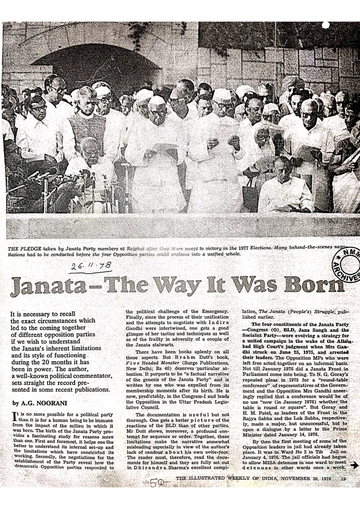This article provides a detailed account of the formation of the Janata Party in India during the mid-1970s, primarily in response to the Emergency imposed by Prime Minister Indira Gandhi. The article, written by A.G. Noorani, offers a critical examination of the political landscape and negotiations that led to the party's creation.
The process of unifying opposition parties began in January 1976 when political prisoners met in Tihar Jail to discuss merging their respective parties. Jayaprakash Narayan (JP) played a crucial role in this process, convening a meeting of various opposition parties and setting up a Steering Committee to draft a policy and program for a unified democratic opposition party. The Bharatiya Lok Dal (BLD), led by Charan Singh, initially pushed for outright merger, while other parties favored a more gradual approach.
Throughout 1976, negotiations continued among the four main constituents - Congress (O), BLD, Jana Sangh, and the Socialist Party. There were disagreements over the timing and method of unification, with Charan Singh at times expressing frustration with the process. The Congress (O), in particular, faced internal resistance to merger from some of its state units.
The article also highlights the controversial role played by the Rashtriya Swayamsevak Sangh (RSS) during this period. The author accuses the RSS of playing a "dual role" by supporting the opposition movement while simultaneously seeking a settlement with the government. Letters written by RSS chief Balasaheb Deoras to Indira Gandhi are described as "essays in sheer sycophancy".
The Janata Party was finally launched in January 1977, shortly after Indira Gandhi announced elections to the Lok Sabha. The author criticizes some accounts, including that of Brahm Dutt, for failing to adequately acknowledge JP's crucial role in the party's formation. The document concludes by noting that this amnesia regarding JP's contribution extends beyond Dutt to many others involved in the process.
This detailed account provides valuable insights into the complex political maneuvering and negotiations that led to the formation of the Janata Party, offering a nuanced understanding of a significant period in India's political history.


